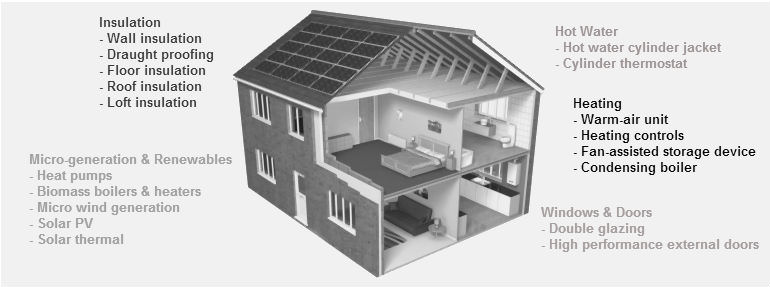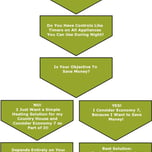Answer these simple questions and we will find you the BEST prices
Which type of solar quotes do you need?
It only takes 30 seconds
100% free with no obligation

Get up to 4 quotes from our selected suppliers by filling in only 1 form

Save money by comparing quotes and choosing the most competitive offer

Our service is 100% free and with no obligation
- GreenMatch
- Blog
- The Green Deal – All You Need To Know
The Green Deal
All You Need to Know About the Green Deal
Like many other of the European countries, the UK has increased its attention to environmental issues during the last years. They have launched different projects and incentives to reduce carbon emissions and switch to more eco-friendly sources of energy. You might have heard about the so-called Green Deal, launched in January 2013. Here we will explain what the deal is about, how it works, and what its outcome has been so far.
What Is The Green Deal?
The Green Deal is a UK policy aimed at helping you make energy-saving improvements to your home and find the best way to pay for them. Which improvement will save you the most energy depends on your home, but the most typical examples are insulation, heating, double glazing, and renewable energy generation (eg. solar panels for homes or heat pumps). Below you can see a picture with nearly all the improvements you can choose from:

You can use the Green Deal finance to pay for any of the above-mentioned measures, but you will have to follow every step of the procedure (which is explained below) to apply for the deal. The loan is repaid through savings made on your electricity bills, therefore your bills should not be higher than they used to be, and once the loan is paid off you can take full advantage of the energy savings.
How Should One Proceed?
The first step to getting a Green Deal Loan is to arrange a visit (which will cost you around £100-150) from an assessor accredited with the Green Deal Quality Mark. The assessor will make a report with suggestions to improve energy efficiency in your house. All companies involved in the Green Deal must bear this mark and follow a code of practice. The Green Deal providers are companies, shops and energy companies that install energy-efficient technology.
Once you have the report, you will be offered quotes from different providers with their finance programs. You will then have to choose the offer that suits your needs best, and the Green Deal Installer will install the measures suggested in the report.
When the measures are installed, you will pay the loan back through your energy bills. The loan is attached to the property rather than to the person that required it, so if you sell the property the next owner will have to continue with the loan repayment. The Government believes Green Deal loans will be repaid at a rate no more than 6.92%. Moreover, it is expected that the savings on energy bills will outweigh the amounts of the repayments.
The UK government hopes that the Green Deal will lead to the renovation of the UK’s housing stock with an estimated 14 million homes having access to energy efficiency improvements.
Some Concepts You Need To Know:
Assessor Organisations: they carry out assessments and visit your property, they tell you what improvements you can make an estimate how much you could save on your energy bills.
Providers: they help you decide if a Green Deal Finance Plan is right for you, provide finance, provide additional assistance through Green Deal Cash Back or the Green Deal Home Improvement Fund and arrange for the installation of improvements. They can also arrange an assessment.
Installers: they install improvements for Green Deal customers and provide assistance through the Green Deal Home Improvement Fund.
Is The Deal Working?
Eighteen months after its launch, the outcomes were not as expected and the deal has been heavily criticised. While the Department of Energy and Climate Change (DECC) had a target of 10,000 Green Deal plans by the end of 2013, government figures indicate there are only 2,439 plans in action or pending. Moreover, until April 2014 just 210,239 Green Deal assessments had taken place, meaning that just over 1% of them have actually taken on the job.
What Do People Say?
To justify the lack of interest in the Green Deal, people argue that the interest rates are high, that the assessment process is complicated, and that there are many difficulties for privately rented housing to apply to the scheme. Moreover, the £100-150 necessary for the Green Deal Assessment have demotivated many to take on the project.
Moreover, some say that assessors give wrong estimates on how much customers were paying for energy and therefore, how much they would save with the improvements. Other householders have complained that the scheme is too expensive and that there are less expensive commercial loans available elsewhere.
What Else Is Being Done?
Faced with the not-so-happy results of the deal, the DECC has announced that the scheme would be complemented by new financial incentives. From 9 June 2014, a £500 payment is available to anyone installing energy-efficiency measures within 12 months of moving into their property. Also, householders can apply for a further £1,000 cashback when implementing any two improvements of a list of 12.
This fund is meant to make it easier and faster for residents to benefit from energy-efficient homes and from the resulting reduced bills. Hopefully, with these measures and others to come, more people will be attracted to eco-friendly practices and invest in green sources of energy.
Fill in the form in just 1 minute
We strive to connect our customers with the right product and supplier. Would you like to be part of GreenMatch?




